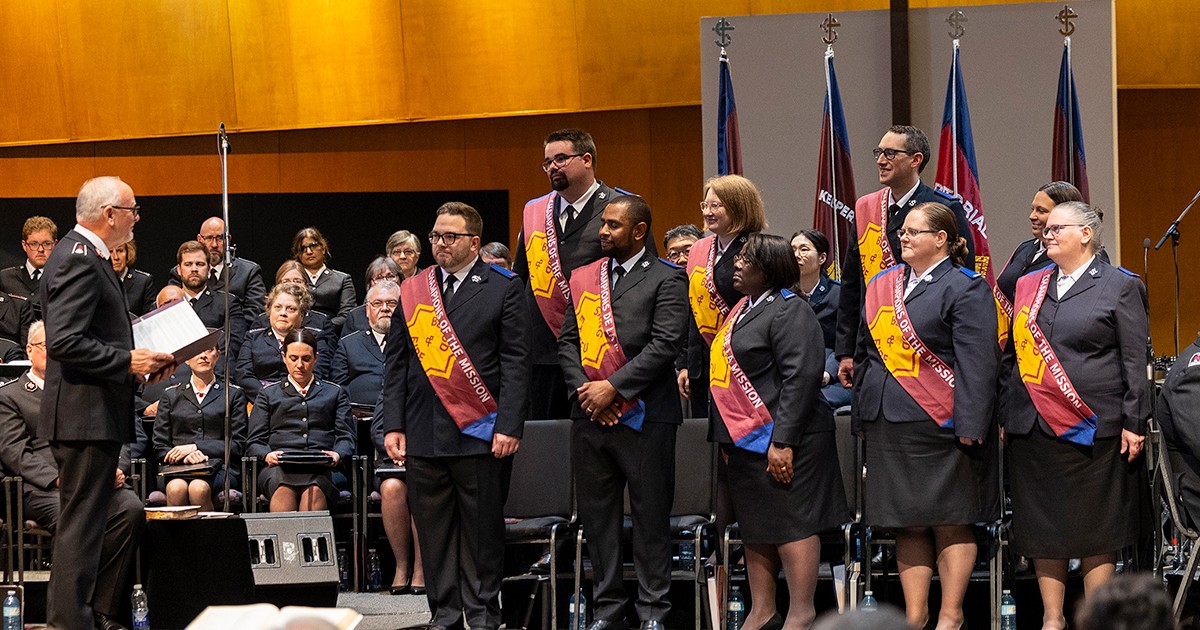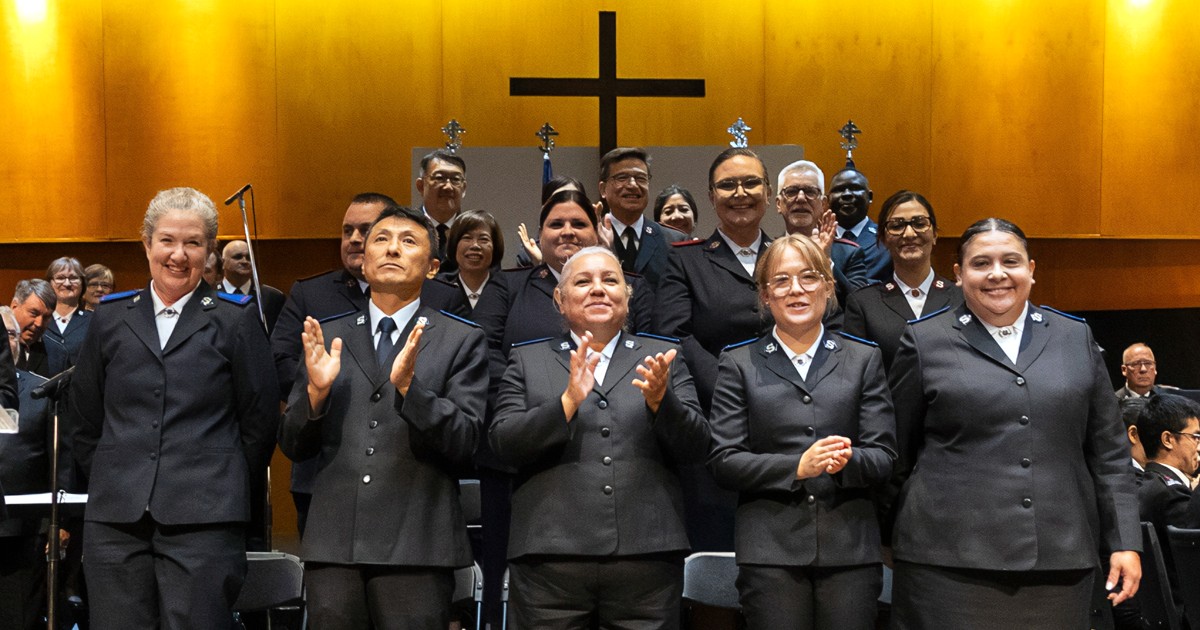 General John Gowans (Rtd) captured the essence of the Army when he said: “The Salvation Army was invented to save souls, grow saints and serve suffering humanity.” Originally an off-the-cuff remark, it reveals a casual genius for communicating the heart and soul of the Movement. It is a succinct articulation of the ideals of the Army, its identity and mission. It reflects a continuum of God's restorative grace at work in the human heart as understood by Salvationists around the world: redemption, holiness and service. It captures the Christlike living that continually restores us to Kingdom relevance.
General John Gowans (Rtd) captured the essence of the Army when he said: “The Salvation Army was invented to save souls, grow saints and serve suffering humanity.” Originally an off-the-cuff remark, it reveals a casual genius for communicating the heart and soul of the Movement. It is a succinct articulation of the ideals of the Army, its identity and mission. It reflects a continuum of God's restorative grace at work in the human heart as understood by Salvationists around the world: redemption, holiness and service. It captures the Christlike living that continually restores us to Kingdom relevance.
The early Army abounded in Kingdom relevance. Its primary goal was to save as many souls as possible through revivalist outreach initiatives such as tent meetings and “preaching stations.” In Wesleyan theological tradition, the Booths increasingly preached holiness of heart. With time, the Booth's pursued what Dr Roger Green calls “a war on two fronts,” with a dual focus on spiritual and social salvation.
The early Army was not only tenaciously committed to Kingdom ends, but also flexible in the means. Uniforms, military jargon and brass bands are a testimony to the Army's pragmatism. In the Booth's day, the Army's adoption of military metaphor tapped into the nostalgia for the glory days of the British Empire. The Army embraced a culturally relevant means to bring about Kingdom ends.
Sadly, all organizations, including the Army, risk drifting from their original purposes and mission. This is expressed in two ways: 1) a focus on means instead of ends, and 2) accepting mediocrity instead of excellence.
Means-End Drift
There is a subtle change that occurs when our focus shifts from ends to means. When the means becomes too familiar, it begins to acquire value in and of itself. It brings comfort and ancillary rewards. For example, playing or singing in a musical group may still be enjoyable, even when it doesn't promote Kingdom ends. Camping and outdoor education activities still provide a sense of adventure, even when they fail to focus on Kingdom concerns. Education may be intrinsically rewarding, but fail to prepare people for authentic ministry. Although we may appear to be aiming at the target, we have lost our focus. Without a sustained, foundational commitment to the Kingdom, the means can quickly become the ends.
One of the areas we agonize about in the Army is music: brass bands, songster brigades, timbrels and contemporary worship bands. Much of the music in the Army is a carry-over from the early days when the Army embraced flexibility and cultural responsiveness. We love our music. But unless these groups continue to promote worship, evangelism and service, we are in danger of forgetting our mission.
The same may be said of our uniforms. They seem highly effective today in some parts of the world (Africa, India) where the Army is exploding in membership, and less effective in other areas of the world (Europe, North America) where Christianity is losing ground or at best holding its own. One must wonder, in those areas where the Army has lost so much ground, if we have drifted into Kingdom irrelevance.
Settling for the Good
Perhaps it is human nature in a fallen world that we tend to settle for what is merely good instead of striving for excellence. The drift into Kingdom irrelevance has much to do with filling up our lives with an abundance of good things that tend to crowd out excellence.
Although we may appear to be aiming at the target, we have lost our focus. Without a sustained, foundational commitment to the Kingdom, the means can quickly become the ends
As parents, we want only good things for our children. We involve them in music, sports, camping and so on. Unfortunately, we are so overextended pursuing all these good things that there was little time for excellence in things of the Kingdom.
The same may be said for the accumulation of material possessions. Having a bigger home, better car, nicer furniture, more elegant landscaping, more exotic travel, larger televisions and stylish wardrobes, give us the illusion of living the good life. In the reality of the Kingdom, however, those things are insignificant. Any good that they represent squeezes out the excellence that is possible. Their insignificance distracts us from what is truly relevant.
Antidote to Irrelevance
The antidote for Kingdom irrelevance is obedience and discipline in pursuing Kingdom ends. It means keeping the means subservient to the ends and not settling for what merely seems good. It is the determination to keep the main thing the main thing.
In his book Good to Great, James Collins notes that great companies are characterized by people who are disciplined in their thinking and action. These people are tenacious about identity and mission. They know who they are. They know what they are in business to do. They stay with the main idea. They are driven by a clear conception of the ends they are pursuing. Moreover, they are ruthless in critiquing and evaluating their progress. They are unafraid to face the brutal facts regarding the effectiveness of their means, strategies and actions.
The same is true of the Early Church and the early Army. In the Book of Acts, the means of proclaiming the Gospel are flexible, while the Kingdom ends are fixed. Likewise, the early Army's persistence in ushering in the Kingdom of God is remarkable. The Army exploded in its size and scope because it kept the main thing the main thing. It stayed faithful to the Great Commission and the aims of the Gospel.
The antidote for irrelevance hasn't changed: stay focused on Kingdom ends, remain flexible in the means and be disciplined in evaluating, adjusting, and where required, abandoning unproductive methods. This is a hard message for those who have their hearts captured by ineffective means. Tragically, we often count someone a faithful Salvationist by observing his or her participation in ineffective means. Such participation is not the engagement of the traditional, but of traditionalism. Where little or no thought is given to the relationship of means to Kingdom ends, we often find traditionalism.
Evaluation and hard critique is necessary to stop behaving in ineffective ways. It will mean putting a stop to characterizing conflict as traditional vs. non-traditional, and recognizing traditionalism when we encounter it. It will mean sorting out effective and ineffective means. It will mean giving up a long list of good things for those fewer things that are truly Kingdom best. It will mean abandoning time, treasures and talents that are caught up with many good things and pursing only Kingdom excellence.
Restoring Kingdom relevance is not an easy undertaking. It must be a matter of personal commitment and the collective will of any faith community. Fundamentally, it is a matter of stewardship. When we come to faith and grow in Christlikeness, the Lord pours more light into our lives and illuminates our circumstances. He does this to call us to partnership with him in transforming his creation. It is a call to thoughtfully and intentionally participate in Kingdom building. While he need not count on us, he delights to do so. We do this in loving response to all he has done for us, as a response to his grace. When we partner with him, we achieve great things for the sake of his Kingdom and the glory due his name.









Leave a Comment